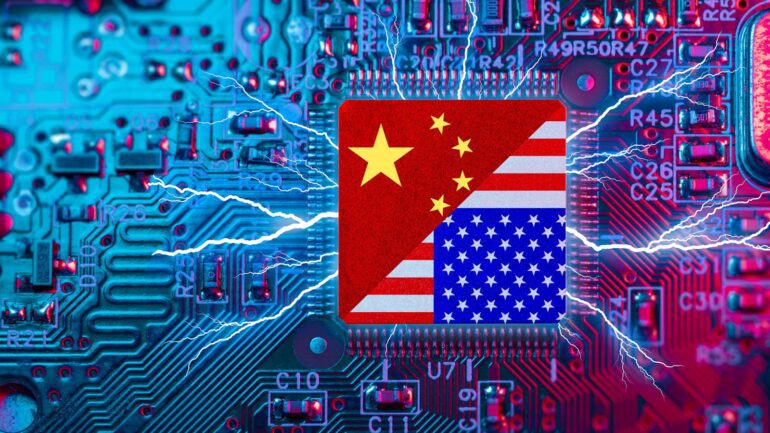TL;DR:
- Chinese AI stocks experience a significant decline on news of potential US restrictions on chip exports to China.
- Nvidia, a major chip manufacturer, is expected to be among the most affected.
- Other Chinese AI players, including Alibaba and Tencent, also see their stock prices drop.
- US Commerce Department may halt chip shipments to China without a license, expanding efforts to limit China’s access to advanced chip technology.
- Beijing previously banned Chinese operators from buying products from Micron Technology, and Washington urged South Korea not to fill the void.
- Nvidia introduced an alternative chip, but the new restrictions would require a special US export license for sales to China.
- Uncertainty looms over the long-term growth and collaboration in the AI sector.
Main AI News:
Chinese artificial intelligence (AI) stocks experienced a sharp decline today following reports in the Wall Street Journal that the United States is considering imposing new restrictions on the export of AI chips to China. This development has sent shockwaves through the industry, impacting major players such as Nvidia, a renowned chip manufacturer. The potential restrictions, which could be implemented as early as July, have raised concerns about the future of AI technology collaboration between the two countries.
Nvidia, widely recognized for its production of graphics chips that power OpenAI’s ChatGPT and Alphabet’s Bard chatbots, is expected to be among the most affected by these measures. The fallout was immediate, with China’s CSI artificial intelligence index plummeting by 3% in Asia. Additionally, shares of Inspur Electronic Information Industry and Chengdu Information Technology of the Chinese Academy of Sciences, both leading producers of computers and software, saw declines of 10% and nearly 8%, respectively.
The impact of these potential restrictions extended beyond Chinese companies, as other AI players in the region faced losses as well. Hong Kong-listed shares of Alibaba, a prominent tech conglomerate that recently launched its own viral chatbot ChatGPT, dropped by approximately 1.6%. Similarly, Tencent, a leading Chinese technology firm currently developing its own AI model, saw a decline of 1.58% in its share price.
The Wall Street Journal report, citing sources familiar with the matter, highlighted the growing concerns within the United States regarding China’s AI capabilities. The US Commerce Department is reportedly contemplating halting the export of chips from Nvidia and other chip manufacturers to customers in China and other countries deemed to be of concern. The potential restrictions could be implemented without the need for a license, further intensifying the impact on the global AI supply chain.
As of now, the Commerce Department has not responded to CNBC’s request for comments regarding this matter outside regular business hours. However, if such restrictions are enacted, they would represent a significant expansion of Washington’s efforts to curb China’s access to advanced chip technology. In October, the US already implemented rules aimed at severing China’s ties to cutting-edge chip equipment. Furthermore, in May, Beijing prohibited Chinese operators of critical information infrastructure from purchasing products from Micron Technology, citing significant security risks.
Notably, Washington has reportedly urged South Korea to refrain from allowing its domestic chip makers to fill the void left by Micron in China. Both Nvidia and AMD, another major US chip giant, have been prohibited from selling their advanced chips to China and Hong Kong since September.
To comply with export control regulations, Nvidia reportedly introduced an alternative advanced chip, the A800, to the Chinese market in November. However, the newly proposed restrictions are expected to halt the sale of A800 chips to China unless a special US export license is obtained. Despite these efforts, Reuters recently revealed that Nvidia’s advanced A100 chips are being surreptitiously sold in China’s underground markets for $20,000 each, double their usual price.
While the full extent of the impact on Chinese AI stocks and the global chip industry remains to be seen, today’s news has already sent shockwaves through the market. Investors are closely monitoring the situation, and it remains uncertain how this potential setback will affect the long-term growth and collaboration in the AI sector. As the story develops, industry stakeholders will need to adapt to changing dynamics and seek alternative solutions to ensure the uninterrupted progress of AI technology worldwide.
Nvidia shares have experienced an impressive year-to-date surge of 187%, while AMD shares have also demonstrated strong performance with a 70.4% increase during the same period.
Conclusion:
The potential US restrictions on chip exports to China have had a profound impact on the Chinese AI market. The decline in stock prices reflects the market’s concerns about the future of AI technology collaboration between the two countries. If implemented, these restrictions would significantly disrupt the global AI supply chain and hinder China’s ability to make technological advancements in the field. Industry stakeholders will need to closely monitor the situation and explore alternative solutions to ensure the continued progress of AI technology worldwide.

